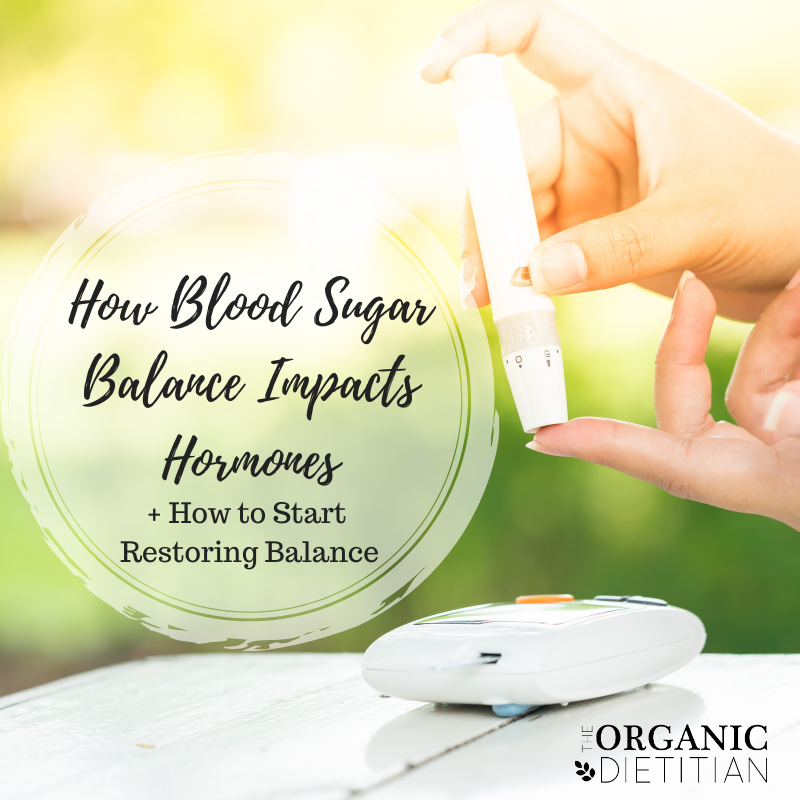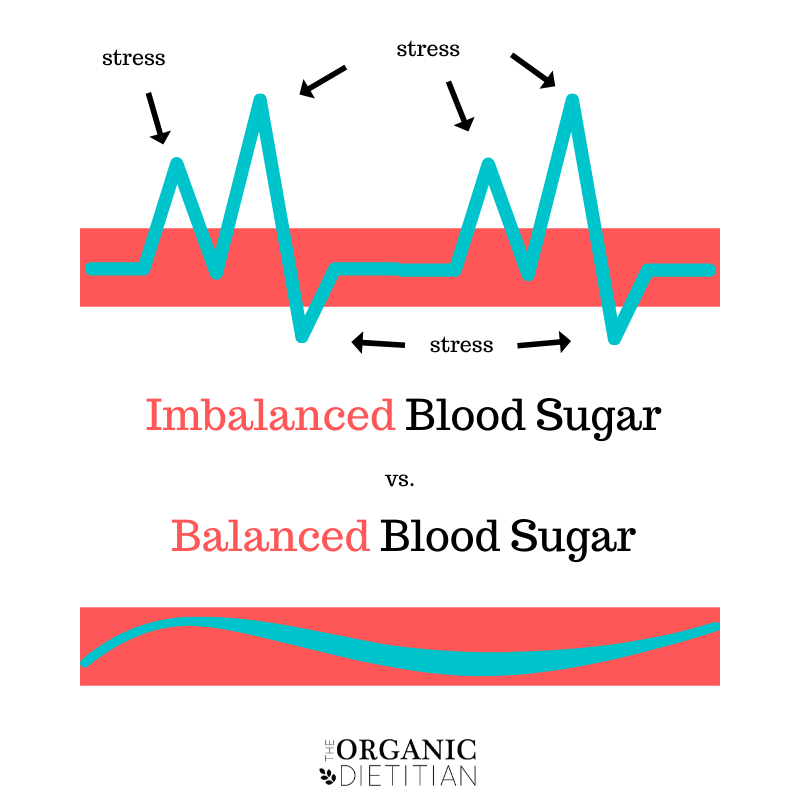How Blood Sugar Impacts Hormones + How to Start Restoring Balance
The best kept secret to healthy hormones? Balanced blood sugar levels.
Unfortunately, so many of us are riding the blood sugar roller coaster — experiencing blood sugar spikes and crashes all day long — and our hormones are getting whiplash as a result.
And yes, even those who eat a healthy diet filled with whole, real foods can accidentally catch a ride!

This is important for us all to be aware of. After all, hormones are a big deal — they tell the body what to do and how to do it, and so we need to make sure they’re healthy and in balance.
So how can you tell if your blood sugar levels may be imbalanced?
Common symptoms of imbalanced blood sugar levels include:
- Fatigue, especially after meals
- Constant hunger
- Strong sugar cravings
- Difficulty losing weight
- Migrating aches and pains
- Trouble falling or staying asleep
- Feeling “hangry,” anxious, or jittery when going too long without eating
Do any of these look familiar to you?
If yes, read on.
How does blood sugar impact hormones?
After we eat carbohydrates — whether from a sweet potato, apple, or cookie — the body breaks them down into glucose, or sugar, which is released into the bloodstream to be used by the body as a form of energy.
This is where insulin comes in. Insulin is a hormone produced by your pancreas that shuttles glucose into the cells to be used for energy. Insulin is important because it stops sugar from accumulating in your bloodstream — it regulates your blood sugar and keeps it within a healthy range.
This is all natural and normal. However, things go awry when there is too much sugar in the bloodstream, or we experience a blood sugar spike. In response and in an attempt to bring things back into balance, the body releases excess insulin. The problem: insulin impacts the body beyond just blood sugar, including specific reproductive hormones.
Elevated and erratic blood sugar levels are also a significant source of stress on the body, and cause a spike in the stress hormone cortisol. Cortisol is also released by the body when blood sugar levels are low. This stress response and increase in cortisol has a domino effect on the body’s other hormones as well.

BLOOD SUGAR AND PROGESTERONE
Cortisol competes with progesterone — when cortisol goes up, progesterone can go down.
This can lead to estrogen dominance, PMS, PCOS, endometriosis, fibroids, heavy and painful periods, migraines, depression, anxiety, acne, and more.
BLOOD SUGAR AND TESTOSTERONE
Your ovaries are actually covered in insulin receptors. Elevated insulin can cause your ovaries to produce more testosterone.
High testosterone can interfere with ovulation and lead to PCOS, irregular periods, or amenorrhea (lack of menstruation).
BLOOD SUGAR AND SHBG (SEX HORMONE BINDING GLOBULIN)
High insulin can also lower SHBG (sex hormone binding globulin).
SHBG binds to testosterone so that it’s not all available at once. So when SHBG goes down, it allows more free testosterone into the bloodstream and this can trigger more hormonal imbalances.
How can we work to balance blood sugar levels for balanced hormones?
BALANCE MEALS WITH PROTEIN, HEALTHY FATS, AND CARBS
A plate filled with carbs — even healthy, whole food sources of carbs — is likely to spike blood sugar levels.
Protein and healthy fats are digested more slowly and so help to slow glucose absorption into the bloodstream, preventing an unhealthy spike in blood sugar. Protein and fat also keep us feeling fuller longer, which helps us overcome the sugar cravings that could set us back on the blood sugar roller coaster.
To be sure to include protein and healthy fats to balance carbs with each and every meal.
DON’T SKIP OUT ON MEALS
When we skip a meal, our blood sugar levels drop. In an attempt to restore balance, the body will release cortisol with the goal of increasing blood sugar stores. In the end, we have a cortisol and blood sugar spike, which is a double-whammy for your hormones.
So to keep things balanced, be sure to have 3 proper meals a day (balanced with protein, healthy fats, and carbs like we just discussed, of course!).
GET 7-9 HOURS OF SLEEP EACH NIGHT
Yet another reason to make sleep a non-negotiable: balanced blood sugar levels and healthy hormones!
Because when we don’t get enough sleep, our cortisol and blood sugar levels rise. This connection is so significant that researchers found that “less than 1 week of sleep restriction can result in a prediabetic state in young, healthy subjects.” (source)
Related: 6 Ways to Improve Your Sleep…Naturally
STRESS LESS
Stress causes blood sugar levels to increase. Again, this connection is so strong that researchers have found that “different forms of emotional stress are associated with an increased risk for the development of type 2 diabetes.” (source)
So for the sake of your blood sugar levels and hormones, go ahead and take a nice, big deep breath, and be sure to include stress reduction into your daily wellness routine.
I enjoy and often recommend meditation apps like Headspace and Calm, though stress reduction looks different for everyone. For you, it may be reading for an hour before bed, taking a relaxing walk during your lunch break, snuggling with a pet, or practicing a hobby. Whatever it is, do more of it!
Do you experience symptoms of imbalanced blood sugar levels?
Will you put any of our practical first steps for balanced blood sugar levels into practice?
Any questions?
Please let us know in the comments below so we can keep the conversation going and support you in your hormonal health journey!
And are you ready to get a clear picture of your hormone levels through testing? Ready for a clear plan to restore hormonal balance?
CLICK THE BUTTON BELOW TO APPLY TO WORK WITH US
As a Registered Dietitian and Functional Diagnostic Nutrition Practitioner, my team and I help clients get proper testing, assist in the process of reading those results using clinical correlation (treating the patient and not just the test results), and give them the proper tools (diet, supplements, and lifestyle) to transform their health.
The post How Blood Sugar Impacts Hormones + How to Start Restoring Balance appeared first on The Organic Dietitian.
Original source: https://theorganicdietitian.com/blood-sugar-and-hormone-balance/
Comments
Post a Comment